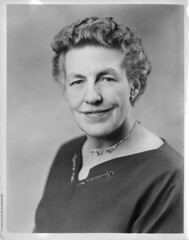 [Image description: black-and-white archival photo of two men seated at a table, in French military uniforms; they have their hands on a small checkerboard; one man appears to have his eyelids closed, and the other has fabric patches over both eyes; behind them, a woman in seated, and has her own hand stretched toward the checkerboard]
[Image description: black-and-white archival photo of two men seated at a table, in French military uniforms; they have their hands on a small checkerboard; one man appears to have his eyelids closed, and the other has fabric patches over both eyes; behind them, a woman in seated, and has her own hand stretched toward the checkerboard]
Co-founder of
Lighthouse International (formerly the New York Association for the Blind)
Winifred Holt was born on this date in 1870, in New York City, the daughter of publisher
Henry Holt. She was
a force in early twentieth-century advocacy --she and her organization worked for inclusion of blind children in New York public schools, for summer camps, vocational training programs and social groups run by and for blind people, for rehabilitation of blinded WWI veterans. She also worked for changes in medical protocols to prevent a common cause of blindness in newborns. She encouraged similar "Lighthouses" to operate in other cities around the world. Many of the projects she started
continue in some form today.
In the photo above (found
here, in the Library of Congress's Bain Collection), Holt is seen teaching newly blind French soldiers to play checkers in a rehabilitation program in France (Holt received the Legion d'Honneur for her wartime work there). Holt trained as a sculptor when she was a young woman; her best known work is a 1907 bas-relief bronze portrait of Helen Keller, online
here. She also wrote a biography of blind English MP and postmaster
Henry Fawcett.


